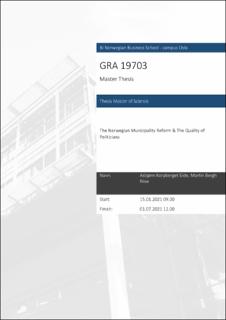The Norwegian Municipality Reform & The Quality of Politicians
Master thesis

View/
Date
2021Metadata
Show full item recordCollections
- Master of Science [1621]
Abstract
This master thesis investigates how the local government reform affected the
quality of local politicians in Norway. Quality is measured by education level and
ability score measured by a regression on income, where we rely on pre political
income as our main source of income statistics. Excellent data on individual
candidates and on aggregate municipal level lets us exploit the time varying and
cross-sectional components of the datasets. A descriptive analysis is done on
multiple variables to elaborate on the effects on the local government reform in
broader terms, while a more qualitative analysis is conducted to find the
relationship of how the local government reform has affected the quality of
politicians in both directly affected and unaffected municipalities. In addition, we
provide an illustrative example of one larger amalgamation to show the local
government reform effects on a municipal level. To estimate the effects of the
local government reform on quality, we employ a standard difference-indifferences
regression analysis in addition to a Mincer earning regression. First,
we find that local politicians are positively selected based on years of schooling
and Mincer score. Second, our empirical models suggest that the local
government reform have a positive effect on the quality of elected politicians
measured by years of schooling and little to no effect when measured by their
ability score. The results suggests that the local government reform had no or very
limited effect on the quality of local politicians elected to council in Norway.
Description
Masteroppgave(MSc) in Master of Science in Business, Economics - Handelshøyskolen BI, 2021